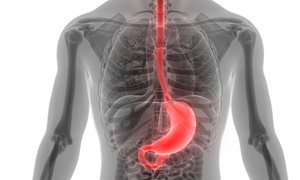5 March 2020
The number of cases of oesophageal cancer and its precursor - Barrett's oesophagus - has increased enormously in recent decades. The disease is usually diagnosed late and at an advanced stage, which makes treatment difficult. Barrett’s oesophagus is a pre-stage of oesophageal cancer, in which healthy, white-coloured cells at the base of the oesophagus have been replaced by aberrant, pink cells. The diagnosis of Barrett's oesophagus is done by using an endoscope with a camera that enters the oesophagus. An unpleasant and expensive procedure, which is poorly suited for population screening.
Volatile compounds
Researchers from Radboud university medical center, Bernhoven and CWZ therefore took a closer look at a less expensive and less cumbersome option. They investigated whether good diagnoses are possible with a portable electronic nose. An e-Nose, which measures volatile organic compounds (VOC) in exhaled air. These gaseous compounds are formed during all kinds of metabolic processes in the body. The idea is that changes in metabolism also lead to a different mix of these compounds. In this manner, you could measure inflammation through exhaled air, for instance, but also abnormal activities in the cells, thanks to the characteristic profiles that accompany them. The question is, how well could you smell Barrett’s oesophagus using such an e-Nose?
Clear profiles
Of the more than 400 patients who participated in the study, 129 had Barrett's oesophagus and 141 had reflux (gastric acid returning to the oesophagus). 132 patients functioned as controls. Yonne Peters, Gastroenterologist researcher at Radboudumc: "After analysis, we saw markedly different exhalation profiles for these three groups. The sensitivity to detecting Barrett's oesophagus was high, namely 91 percent. This means that the test detects 91 out of 100 people with Barrett's oesophagus based on their exhalation profile. Selection of people who don't have Barrett's oesophagus - the specificity - is 74 percent."
Non-invasive screening
"These figures are comparable to breast and colon cancer screening,” says gastroenterologist and research coordinator Peter Siersema. "After these encouraging results, further research among larger groups of people is obviously needed. If these results persist, its user-friendliness and low cost could contribute to making this breathalyser test interesting for non-invasive screening of Barrett's oesophagus by general practitioners."
Publication in GUT Detection of Barrett’s oesophagus through exhaled breath using an electronic nose device
Yonne Peters, Ruud W M Schrauwen, Adriaan C Tan, Sanne K Bogers, Bart de Jong, Peter D Siersema

The number of cases of oesophageal cancer and its precursor - Barrett's oesophagus - has increased enormously in recent decades. The disease is usually diagnosed late and at an advanced stage, which makes treatment difficult. Barrett’s oesophagus is a pre-stage of oesophageal cancer, in which healthy, white-coloured cells at the base of the oesophagus have been replaced by aberrant, pink cells. The diagnosis of Barrett's oesophagus is done by using an endoscope with a camera that enters the oesophagus. An unpleasant and expensive procedure, which is poorly suited for population screening.
Volatile compounds
Researchers from Radboud university medical center, Bernhoven and CWZ therefore took a closer look at a less expensive and less cumbersome option. They investigated whether good diagnoses are possible with a portable electronic nose. An e-Nose, which measures volatile organic compounds (VOC) in exhaled air. These gaseous compounds are formed during all kinds of metabolic processes in the body. The idea is that changes in metabolism also lead to a different mix of these compounds. In this manner, you could measure inflammation through exhaled air, for instance, but also abnormal activities in the cells, thanks to the characteristic profiles that accompany them. The question is, how well could you smell Barrett’s oesophagus using such an e-Nose?
Clear profiles
Of the more than 400 patients who participated in the study, 129 had Barrett's oesophagus and 141 had reflux (gastric acid returning to the oesophagus). 132 patients functioned as controls. Yonne Peters, Gastroenterologist researcher at Radboudumc: "After analysis, we saw markedly different exhalation profiles for these three groups. The sensitivity to detecting Barrett's oesophagus was high, namely 91 percent. This means that the test detects 91 out of 100 people with Barrett's oesophagus based on their exhalation profile. Selection of people who don't have Barrett's oesophagus - the specificity - is 74 percent."
Non-invasive screening
"These figures are comparable to breast and colon cancer screening,” says gastroenterologist and research coordinator Peter Siersema. "After these encouraging results, further research among larger groups of people is obviously needed. If these results persist, its user-friendliness and low cost could contribute to making this breathalyser test interesting for non-invasive screening of Barrett's oesophagus by general practitioners."
Publication in GUT Detection of Barrett’s oesophagus through exhaled breath using an electronic nose device
Yonne Peters, Ruud W M Schrauwen, Adriaan C Tan, Sanne K Bogers, Bart de Jong, Peter D Siersema
Related news items

Mohrmann Stipend for Bakker and Peters
12 December 2019 Tuesday 10 December, Esmée Bakker and Yonne Peters were awarded a Christine Mohrmann stipend. The grant – 5000 euros each – gives them an opportunity to spend time at another university, preferably one abroad. go to page
Electronic nose detects bacterium that can cause stomach cancer
10 September 2019 OP Oost promotes innovative cooperation between companies and research institutions. go to page
Barrett oesophagus
6 June 2019 In Nature Reviews Disease Primers Yonne Peters and Ali Al-Kaabi provided a global overview of Barrett oesophagus and outlined key open research questions. This primer covered epidemiology, disease mechanism, diagnose, screening, prevention, management, and quality of life. go to page
How to approach a patient with refractory or recurrent benign esophageal stricture
31 January 2019 In Gastroenterology Peter Siersema described the currently used treatment modalities for complex esophageal strictures, based on underlying cause and symptom duration, but also focusing on future treatment perspectives. go to page
Low risk of progression in persistent non-dysplastic Barrett’s esophagus
19 September 2018 In Clinical Gastroenterology and Hepatology Peter Siersema and Yonne Peters showed that patients with stable persistence of non-dysplastic Barrett’s esophagus have a low risk of malignant progression and may not benefit from routine endoscopic surveillance. go to page